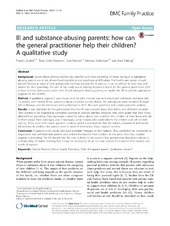| dc.contributor.author | Gullbrå, Frøydis | en_US |
| dc.contributor.author | Smith-Sivertsen, Tone | en_US |
| dc.contributor.author | Rørtveit, Guri | en_US |
| dc.contributor.author | Anderssen, Norman | en_US |
| dc.contributor.author | Hafting, Marit | en_US |
| dc.date.accessioned | 2017-06-07T08:54:20Z | |
| dc.date.available | 2017-06-07T08:54:20Z | |
| dc.date.issued | 2016-11-08 | |
| dc.identifier.issn | 1471-2296 | |
| dc.identifier.uri | https://hdl.handle.net/1956/15935 | |
| dc.description.abstract | Background: Severe illness among parents may interfere with their parenting. Children having ill or substanceabusing parents are at risk of own health problems and psychosocial difficulties. The health care system should identify families in need of help and provide the help needed. For ill parents, it can be difficult to seek help and advices for their parenting. The aim of this study was to identify important factors for the general practitioner (GP) to bear in mind during encounters with ill and substance-abusing parents, to enable the GP to provide appropriate support for the children. Method: A qualitative approach was chosen and the data material was semi-structured individual interviews with 12 parents with mental illness, substance abuse or severe somatic illness. The participants were recruited through GPs in Norway, and the interviews were performed in 2014. We used systematic text condensation for analysis. Results: It was important for the participants that the GP was oriented about their family and children’s situation. They wanted to be regarded as competent parents in ordinary families; however, they were aware that their illness affected their parenting. They expressed a need for advice about how to inform the children of their illness and talk to them about their challenges, and, if necessary, utilize helpers who could inform the children and talk to them directly. There were often many agencies involved, and it was important that the helpers cooperated and shared information. In addition, the parents were in need of information about support services. Conclusion: Ill parents in this study conveyed a double message to their helpers. They wanted to be considered as responsible and well-intended parents who wished the best for their children. At the same time they needed support in parenting. The GP should take the time to listen to the parents’ first spontaneous description about an ordinary daily life (while realising that it may not necessarily be an accurate report), then explore their worries and needs of support. | en_US |
| dc.language.iso | eng | eng |
| dc.publisher | BioMed Central | eng |
| dc.relation.ispartof | <a href="http://hdl.handle.net/1956/15936" target="_blank">Children as next of kin and the general practitioner. A qualitative study about the general practitioner’s opportunities to help</a> | |
| dc.rights | Attribution CC BY | eng |
| dc.rights.uri | http://creativecommons.org/licenses/by/4.0 | eng |
| dc.subject | General practice | eng |
| dc.subject | Family health | eng |
| dc.subject | Parenting | eng |
| dc.subject | Child of impaired parent | eng |
| dc.subject | Qualitative research | eng |
| dc.title | Ill and substance-abusing parents: how can the general practitioner help their children? A qualitative study | en_US |
| dc.type | Peer reviewed | |
| dc.type | Journal article | |
| dc.description.version | publishedVersion | en_US |
| dc.rights.holder | Copyright 2016 The Author(s) | |
| dc.source.articlenumber | 154 | |
| dc.identifier.doi | https://doi.org/10.1186/s12875-016-0553-5 | |
| dc.source.journal | BMC Family Practice | |
| dc.source.40 | 17 | |

